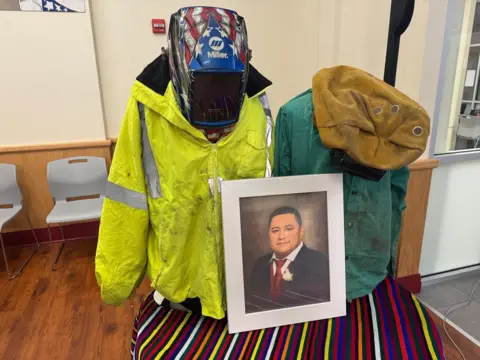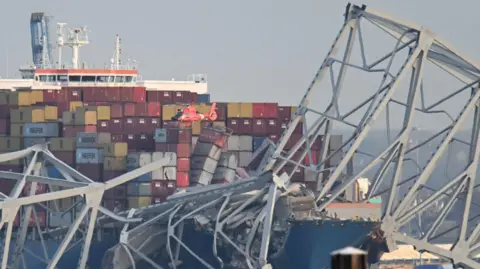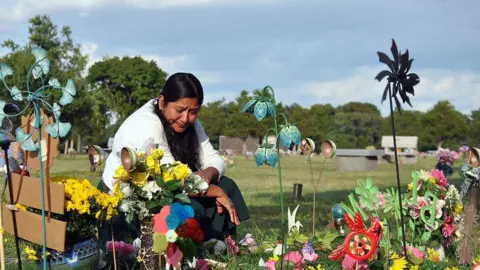ARTICLE AD BOX

 Bernd Debusmann Jr/BBC News
Bernd Debusmann Jr/BBC News
Salvadoran immigrant Miguel Angel Luna Gonzalez left behind a wife and three children when he died in the Key Bridge collapse.
As the sun was rising Baltimore 26 March, Maria del Carmen Castellón received news that she never expected: her husband, Miguel Angel Luna Gonzalez, was missing in the cold, dark waters of Maryland’s Patapsco river.
"I got a knock on the door from my husband's son," she recalls. "It's news I wouldn't wish on any wife. At that moment, I wished I had wings so I could fly and save him."
Luna, a 49-year-old father of three originally from El Salvador, was one of eight workers fixing potholes on Baltimore’s Francis Scott Key Bridge when it was struck by a 948ft (289m) cargo ship - the M/V Dali - sending an estimated 3,000 to 4,000 tonnes of debris into the shipping channel below.
Six of the workers - all originally from Latin America - died in the bridge collapse.
It would be more than five weeks until Luna’s body was recovered in early May.
"That was the hardest day of my life," Ms Castellón said. "It opened a wound in my heart that will never heal."
Now, six months on from the disaster, the families of three of the dead workers are suing the shipping company, Grace Ocean Private Ltd, arguing that its "negligence" and actions directly led to the collapse of the bridge and the deaths of their loved ones.
"We're fighting for justice," added Ms Castellón, speaking in Spanish to reporters at the Baltimore offices of Casa, an advocacy organisation focused on immigrants. "Justice means preventing future tragedies."

 Getty Images
Getty Images
Eight men were on the Francis Scott Key Bridge when it was struck by the M/V Dali on 26 March - six of whom died.
While a National Transportation Safety Board (NTSB) investigation into the incident is ongoing, a preliminary report issued in May found that the Dali had lost electrical power four times in a span of less than 12 hours before colliding with the Key Bridge.
"There's a lot that we still don't know," said Matthew Wessler, a lawyer working on behalf of the three families. "But in our view, that [the repeated loss of power] should have led the ship to fully assess what had gone wrong and fix the problem."
In federal court earlier this year, Grace Ocean sought to limit its legal exposure from the disaster.
Contacted by the BBC, a spokesman for Grace Ocean said the filing of claims from the families "was anticipated", but the company "will have no further comments on the merits of any claim" for the time being.
The lawsuit is one of several faced by Synergy and Grace Ocean in the wake of the accident.
The city of Baltimore and a collection of local business owners have also sued the firms, claiming that the ship was unseaworthy when it set off for its March voyage.

 Jossie Flor Sapunar/CASA
Jossie Flor Sapunar/CASA
Ms Castellón says that her plans for the future were dashed with the death of her husband.
Speaking to reporters in Baltimore on Tuesday, Ms Castellón recalled that the day before the accident, the couple went to look at a rental property where they were hoping to open a small restaurant.
The two had already worked together on a food truck, with Luna helping when not at his construction job.
"As we looked through the windows, we spoke about a future in which he wouldn't have to suffer at a dangerous job," Ms Castellón said, crying. "Those moments were filled with laughter, and love," she added.
"But those dreams were shattered that morning when I lost him," Ms Castellón added.
That night as he left for work, he left her a letter which he signed off with "I love you".
"I carry that in my heart now," she added.
Lawyers and immigration advocates working with the families say they also hope the incident highlights the often dangerous - but crucial work - of immigrants in the US.

 8 months ago
31
8 months ago
31








 English (US) ·
English (US) ·